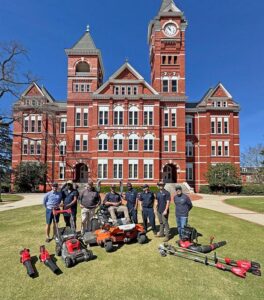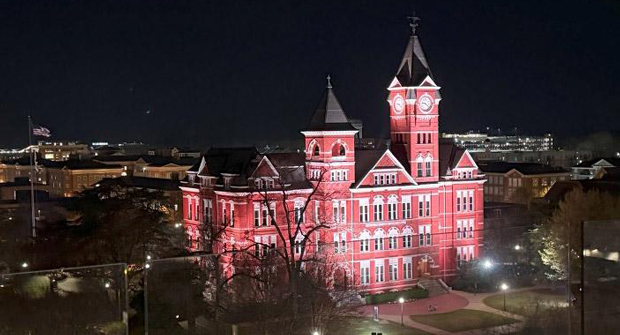The American Green Zone Alliance (AGZA) visited Auburn University (AU) to expand a collaboration focused on advancing electric outdoor power equipment testing. With this milestone, AU is officially recognized as an AGZA AFTC Field Testing Site for the Southeast region, what the alliance is calling a major step forward in sustainable land care leadership.
The visit was packed with activity:
- Observing equipment in real-world operation
- Installing a new robotics system
- Leading classroom and field training sessions for AU’s landscape maintenance crews
- Identifying areas across campus that are strong candidates for AGZA Green Zone Certification
AGZA and AU teamed up with Sunseeker representatives to install a commercial robotic mower system, just in time to address the high demands of the spring mowing season.
Looking ahead, AU and AGZA will closely monitor the new robotics system with a hands-on, in-person approach and real-time tracking through the Sunseeker app. Key data points such as error code frequency, workload productivity, aesthetic outcomes and connectivity reliability will be analyzed to ensure maximum efficiency and performance.

AGZA shadowed AU’s landscape maintenance crews, observing the step-by-step operation of Milwaukee’s handheld tools and portable field chargers. String trimmers, stick edgers, leaf blowers and 21-inch self-propelled walk-behind mowers were all put through their paces to evaluate performance, ergonomics and determine how many battery swaps are needed to match traditional two-stroke fuel or gasoline use.
Milwaukee’s battery platforms are presently undergoing AGZA AFTC Field Certification testing across four diverse U.S. regions.
Meanwhile, AGZA continues to collect real-world feedback on the AGZA AFTC Certified Stihl RZA riding mower, ensuring that evolving crew experiences are reflected in updated performance data.
The goal is to offer the industry’s most detailed and impartial insights into battery electric equipment durability and longevity, according to the alliance.
The collaboration culminated with a lunch-and-learn session hosted by the AU Department of Horticulture, where AGZA engaged the university’s grounds crews. Topics included the fundamentals of low-impact land care and the potential for future AGZA Green Zone Certifications across campus.
As AU transitions toward battery electric equipment, their dedication to preserving the university’s aesthetic standards shines brightly. AGZA is proud to deepen its collaboration with AU, advancing the science, standards and future of sustainable land care together.


